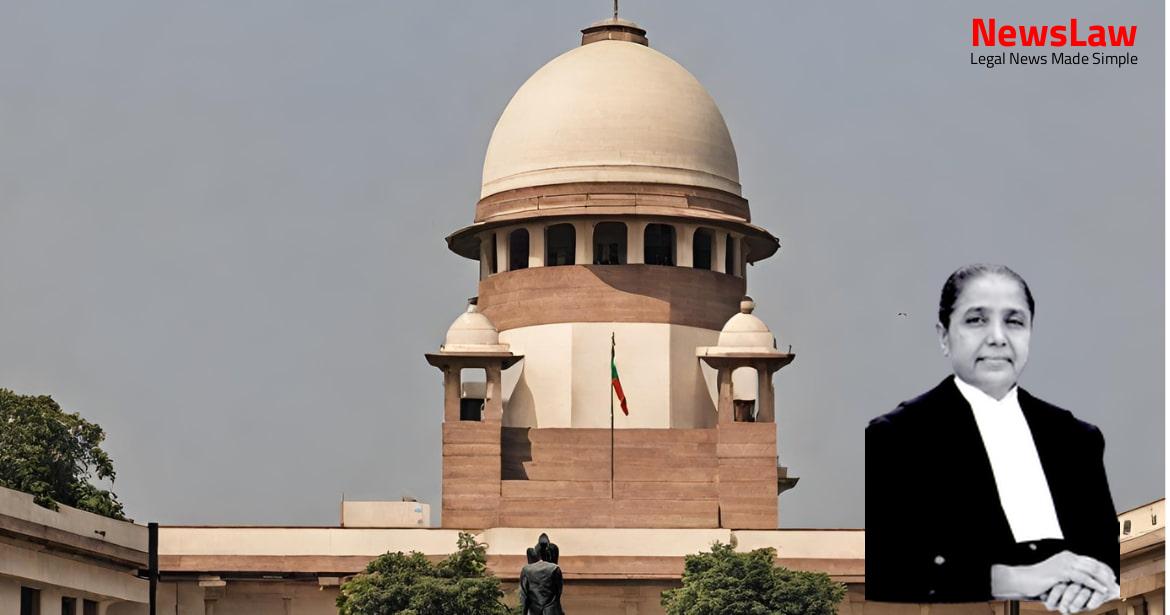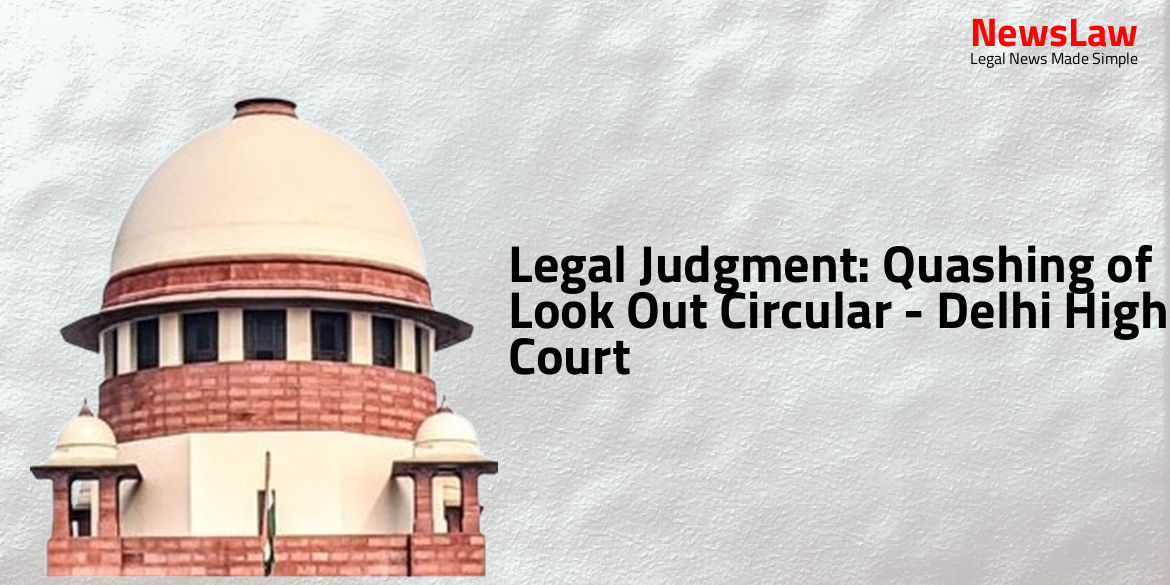In a significant legal battle concerning a land dispute and adverse possession claim, the Supreme Court of India has pronounced its verdict. The case involves a dispute over land ownership and the validity of adverse possession raised by the parties involved. The judgment sheds light on the necessity of presenting concrete evidence and accurate legal pleadings in civil proceedings, ultimately impacting the final outcome of the case.
Facts
- The defendants admitted that the plaintiff held the suit land in his bhumiswami rights.
- Defendants cultivated the suit land for two consecutive years – 1973 and 1974.
- Defendants admitted to cultivating the suit land for more than two years.
- Defendants claimed joint family business of bangles with the plaintiff’s family.
- Defendants mentioned the installation of an electric pump, well, and rooms on the suit property.
- Defendants claimed possession of the suit land even after it was transferred to the plaintiff in 1968.
- Defendants raised special objections of adverse possession and limitation, claiming possession for over 12 years.
- The suit land was characterized as Joint Hindu Family property purchased in 1963 by the father of the defendants and his brothers.
- The suit land purchase was in the name of Sitaram, a cousin shared by the plaintiff and the defendants.
- The civil suit was filed in 1986 for recovery of possession and damages by the plaintiff against the defendants.
- Defendants claimed oral partition of properties in 1976 but failed to prove it.
- Defendants filed an application to acquire occupancy tenant rights in 1981 but it was rejected.
- Defendants admitted plaintiff’s ownership of the suit schedule property in the rejected application.
- Defendants’ claim of permissive possession contradicted their claim of adverse possession in court.
- Trial Court initially dismissed the suit stating it was Joint Hindu Family property and barred by limitation.
- First Appellate Court overturned Trial Court’s finding of Joint Hindu Family property.
- Evidence showed joint business prior to 1952 could create presumption of joint family.
- Suit land purchased in 1963 with income of joint family was considered joint family property.
- Execution of the sale deed in 1968 without proper authority was deemed void.
- High Court reversed the dismissal of the suit and decreed recovery of possession for the plaintiff.
Also Read: Sanction Order Compliance Case: Fuleshwar Gope vs. State of India
Issue
- The High Court declined to accept the appellant’s contention that they perfected the title over the suit land by adverse possession.
- The claim of the Plaintiff is being questioned on the basis of Limitation.
- It is alleged that the Defendants forcibly took possession of the suit land in 1983.
- The Plaintiff is seeking possession of the suit land from the Defendants.
- The question of whether the Defendants have completed 12 years of continuous and uninterrupted possession on the suit land is under consideration.
- There is a claim that the father of the Defendants transferred the suit land in the Plaintiff’s name in 1968.
- The Trial Court framed 11 issues including possession of the suit land, income from the land, and ownership of the land by the Plaintiff.
Also Read: Legal Victory for M/s. Baijnath Choubey & Co.: Landmark Judgment by Supreme Court of India
Arguments
- The High Court was justified in interfering with the judgments and decree of the lower courts due to a perverse appreciation of evidence.
- The defendants claimed adverse possession over the suit schedule property since 1968.
- The suit filed by the plaintiff was considered barred by limitation as it was not filed within 12 years from the alleged sale.
- The contention is supported by Section-4 of Benami Transactions (Prohibitions) Act, 1988 and Article 65 of the Limitation Act, 1963.
- The possession of the defendants was considered permissive according to their own admission in Ex-P-4, and it could not be termed as adverse possession unless proved to be adverse to the title of the property for a continuous period of 12 years or more.
- Possession of defendants as Adhiyadar could only be permissive and not adverse.
- The possession cannot be considered as adverse possession.
- The argument that possession was adverse is not valid.
Also Read: Landmark Judgement on Woman’s Property Rights: Stridhan Case Summary
Analysis
- The appellants claimed that the sale deed dated 04.06.1968 was bogus and sham, but the High Court found that the plaintiff had satisfactorily established his title over the suit land.
- The appellants raised a claim of adverse possession, but the High Court emphasized the importance of proper pleading and evidence in civil proceedings.
- The evidence presented by the defendants regarding adverse possession was found to be insufficient by the High Court.
- The High Court highlighted the requirement of ‘animus possidendi’ under hostile color of title for claiming adverse possession.
- The appellants also raised a contention of oral partition, but the High Court rejected this claim based on the evidence presented.
- The High Court analyzed the rejection of the application for mutation of names and the subsequent legal proceedings confirming the plaintiff’s ownership.
- The High Court emphasized the importance of proving adverse possession and the starting point of limitation under the Limitation Act.
- The High Court concluded that the sale deeds transferring ownership to the plaintiff were valid and the appellants’ claim of adverse possession was unsubstantiated.
- The First Appellate Court held that the finding of the Trial Court regarding the sale of the suit land by Sitaram to the plaintiff did not confer any title to the plaintiff as per law.
- To establish adverse possession, three classic requirements must co-exist: continuity, publicity, and being adverse to the competitor’s title and knowledge.
- Reference to the decision in Saroop Singh v. Banto was made, emphasizing the prohibition against suits or claims based on benami property transactions.
- The burden of proof regarding title and possession shifted from plaintiffs to defendants under the Limitation Act, 1963.
- The judgment considered the starting point of limitation based on when the defendant’s possession became adverse, not when the right of ownership arose for the plaintiff.
- The nature of evidence must align with the pleadings; otherwise, it cannot be relied upon or considered.
- The trial court’s finding on the suit property being Joint Hindu Family property and the lack of title conferred to the plaintiff through the sale by Sitaram was deemed contrary to law.
- Section 11 of the Indian Contract Act, 1872 discusses the competency to contract.
- According to this section, every person who is of the age of majority, of sound mind, and not disqualified by any law is competent to contract.
- The reference to the Indian Majority Act, 1875 is made in determining the age of majority.
- Competency to contract enables a person to transfer property as allowed by the law in force.
- The appellants failed to establish the requirements for adverse possession.
- The High Court rightfully interfered with the claim of adverse possession and satisfaction of the prescriptive period.
- Concurrent findings could be set aside if perversity is found with the impugned decision, as per the ruling in D.R. Rathna Murthy v. Ramappa.
- The well-merited decision of the High Court in the impugned judgment does not invite interference in the exercise of appellate jurisdiction.
- The appeals are liable to be dismissed as per the above discussion.
- The period of limitation is to be reckoned from the date of commencement of the plaintiff’s right of ownership over the suit land.
- Allegations of contempt involve creating third party rights in the property during the pendency of the Civil Appeal and after the order of status quo was passed.
Decision
- Contempt Petition arises from an order passed on 27.03.2015 in Civil Appeal Nos. 3159-3160 of 2019.
- Status quo regarding possession was ordered to be maintained by the parties until further orders.
- On 27.10.2020, the court ordered that the contempt petition along with the civil appeals be finally disposed of.
- With the dismissal of the civil appeals, the High Court’s judgment and decree were confirmed, entitling the plaintiff to recover possession of the suit property.
- The contempt petition is being closed in view of the judgment in Civil Appeal Nos. 3159-3160 of 2019, allowing the plaintiff to execute the decree.
- The appellants are mandated to deliver vacant possession of the suit land to the plaintiff.
Case Title: NEELAM GUPTA Vs. RAJENDRA KUMAR GUPTA (2024 INSC 769)
Case Number: C.A. No.-003159-003160 – 2019



